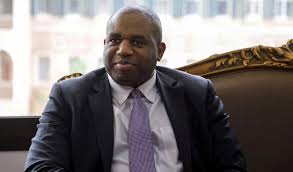UK Labour eyes closer relations with EU

London: Britain under Labour would forge a closer relationship with Europe, the party’s international affairs spokesman said Friday as he laid out the likely next government’s approach to foreign policy.
David Lammy is expected to become UK foreign secretary if the Labour opposition defeat the ruling Conservatives at a general election due later this year, as opinion polls predict.
“The next election is an opportunity to turn the page on the post-Brexit rancour of the past,” said Lammy, referring to Britain’s acrimonious exit from the EU following a 2016 referendum.
“I want to get back to structured dialogue with the European Union on the issues that matter,” the 51-year-old told reporters in London.
At the heart of that is a new “security pact” that Labour wants to have with the 27-member bloc.
It would drive “closer coordination across a wide variety of military, economic, climate, health, cyber, and energy security issues,” Lammy wrote recently in Foreign Affairs magazine.
He added in his article that it would complement both parties’ “unshakeable commitment to NATO” and said Britain should “double down on its close relationships with France, Germany, Ireland, and Poland”.
Labour has ruled out a return to the European single market, customs union or free movement if it wins power, with Brexit still a toxic political issue in the UK.
It does, however, plan to pursue a British-German defence accord similar to the Lancaster House agreement that the UK signed with France in 2010.
Lammy suggested that a youth mobility scheme proposed by the European Commission recently making it easier for Britons aged 18-30 to live, study and work in the EU could be included in a future relationship.
“That’s part of the discussions that we’ll enter into,” he said.
Brexit saw the UK withdraw from the EU’s Erasmus student exchange programme, then propose its own global version, the Turing Scheme.
Labour, out of power since 2010, has enjoyed double-digit leads over the Conservatives for about 18 months.
Its leader Keir Starmer, who voted to remain in the EU, last November said Beethoven’s “Ode to Joy” — the European anthem — best summed up his party.
Prime Minister Rishi Sunak, who voted to leave the bloc, is yet to announce the date of the election but it must be held by January 28, 2025.





